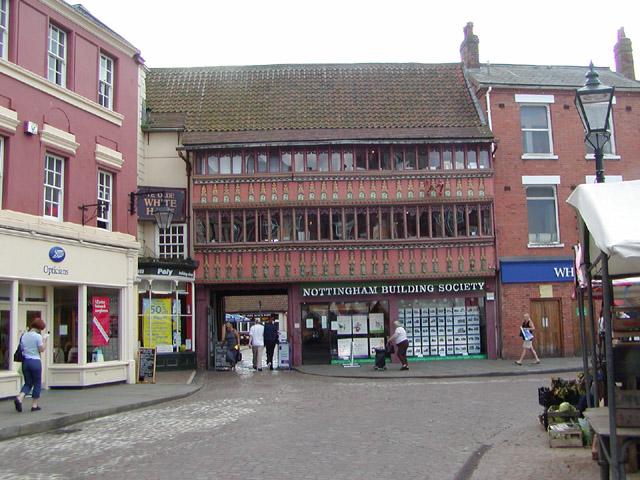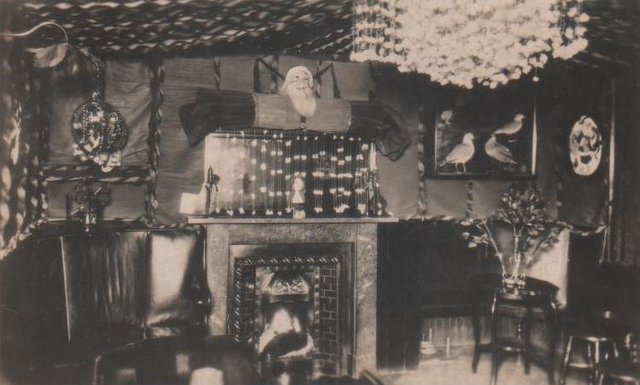» Main Index

» Search This Site

» Submit Update

» Contact Us


|
|

|
Home > Nottinghamshire >
Newark > Olde White Hart
Olde White Hart

|
|
Picture source: Peter
Langsdale |
|
|
|
|
The Olde White Hart was a grade-II listed coaching inn situated
on the Market Place, and is now used as a branch of the Nottingham Building
Society. Publican in 1921 was William Burrows |
|
|
|
The Olde White Hart is one of the best examples
of a late 15th century building in England. Its highly decorated main front
has tiny figures of saints in the uprights. and inside are vestiges of a
14th century great hall of an earlier inn. John Cotham Bainbridge, Mayor,
mercer, draper and funeral furnisher bought the Olde White Hart in 1847,
it's long glass third floor providing an ideal location for dressmaking. He
employed 59 workers (18 male and 41 female) from the age of 14 as milliners
and seamstresses and salesmen. After 1897 the Brothers Charles and Frederick
Atter (who was once manager) took over. During WW1 they produced uniforms
for the Army, and leased shops in the arcade to select retailers. After the
Atters died in the 1930's, Rowell's took over, but still called it
Bainbridges, they sold it to the Brotherton Group in 1968 who used it for
fashion sales. The Nottingham Building Society took over in 1979. |
|
picturethepast.org |
|
|
|
Listed
building details: |
Former hotel, now building society office. Dated by dendrochronology as
follows: rear (south) wing c1312, extended c1526 and remodelled C17. East
wing c1320. Front range c1470, rear gallery and stair turret early C16,
glazed mid C17. Altered c1870. Main ranges restored 1983 and south wing
restored 1990, by Guy St John Taylor Associates. Timber framing with
rendered rubble and brick nogging, with pantile roofs and plain tile verges.
Close studded 3 storey front range, 3 storeys, 4 bays, has to left a
recessed unjettied bay with a 16 pane sash. The 3 bays to right are jettied
and have
continuous windows with wooden traceried heads. Above each billeted
bressummer are plaster figures with crocketed canopies attached to each
stud. On the ground floor, an open carriageway flanked to right by a C20
shopfront with 2 windows. At the rear above the carriageway, a 2 bay jettied
glazed gallery with turned mullions. South wing has to right 4 bay range,
C14, formerly an open hall, 2 storeys plus attics. Colourwashed brick
underbuild, close studding above, with render. Similar lower C16 range to
left, 2 storeys plus attics, 5 bays, has a coped gable. Both have scattered
fenestration, mostly C19 and C20. East wing, formerly a first floor hall,
has a gable stack. 2 storeys, 4 bays. Painted brick underbuild with rendered
timber framing above. Two 12 pane sashes on each floor, those below being
smaller. The 2 right hand bays have a lower pitched roof and form part of
the adjoining C19 public house, whose main range conceals them. 3 storey
stair turret in return angle has C20 brick underbuild and arch braced close
studding above. On the upper floors, a continuous window on each side, 6 and
7 lights, those facing the carriageway with C17 turned balusters. Interior:
south wing north end has the upper parts of jowled posts, collar beam and
substantial remains of a collar purlin roof. 5 bays to south have some wall
studs and mainly C19 roof. East wing has framed gable and 2 trusses with
arch braces. The two western bays have a restored collar purlin roof. Front
range first floor has chamfered spine and span beams and central
stud wall with C20 screens in the other bays. 2 western bays have wall
painting. Second floor has stud walls, some with arch braces, and chamfered
span beams with arch braces. Eastern bay has wall painting. Single purlin
roof with wind braces except in the eastern bay. Stair turret has single
purlin roof and patterned framing in the gable. This building was an inn
from c1430 to c1870, after which it was converted to a shop. Described by
Pevsner as "one of the paramount examples of late C15 timber framed
architecture in England". |
|
|
|
Do you have any anecdotes, historical information, updates or photos of this pub? Become a contributor by submitting them here. Like this site? Follow us on

Make email contact with other ex-customers and landlords of this pub by adding your details to this page. |
|
|
|
Other Photos |
 |
|
Date of photo: 1920s |
Picture source: Rosemary
Speck |
|

|
|
Date of photo: 1920s |
Picture source: Rosemary
Speck |
|
|
|
|
|